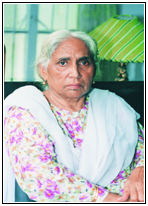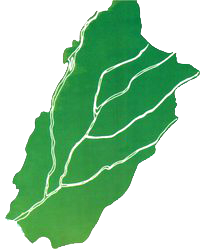AUTHOR: Farkhanda Lodhi: Spirited Feminist
By Shehar Bano Khan
 |
 |
At the age of 64, Farkhanda Lodhi is acutely conscious of the remaining flickering years of her life. She equates them with a dying candle’s stubborn flame before it totally burns out. Her life-long contribution to Urdu and Punjabi literature has exacted a fairly heavy toll on her health. Before retiring in 1997 as the chief librarian at the Government College, in Lahore, Lodhi rearranged the library’s 150 years old record. As a consequence of handling chemical-laden books, she contracted a serious illness of the throat which caused her to temporarily lose her voice.
Though Lodhi can now speak haltingly, she might not be able to follow the trail of her last Urdu publication, Romaan ki maut, published in 1997. Paralysed for the past three years, she cannot hold a pen long enough to overpower the readers with her literary deluge of novels and short stories in Punjabi and Urdu. Instead, her spirited mind forces her to channel her energy to write Punjabi poetry. And so, the writer refuses to accept physical incapacities. Following are some excerpts of the interview with the Dawn.
Dawn: Do you think that, at last, you were honoured for your work when you received the best writer’s award in Punjabi literature from the Punjabi World Foundation in the year 2001?
Farkhanda Lodhi: I was one of the six people in Pakistan to get it. Naturally, I was pleased. Honestly speaking, I have never written for recognition, which is not to say that it is not good. I am forced by my feelings and my environment to write.
Dawn: Are you not the only woman so far to have received this prestigious award?
FL: (Laughs) You know, I think Fakhar Zaman must have thought that she was going to die soon, so let’s give her this award. But yes, you are right. I think, if my memory is not failing that I am the only woman.
Dawn: In most of your novels, why are the characters of your women so bold and strong? Do you think that unconsciously you might be tilted towards feminism?
FL: No, not unconsciously. The effort is rather deliberate on my part. I feel the ache in my heart when a woman is victimized or treated unjustly. Obviously, as a writer how else can I express myself? Men have always been grossly unfair to women. To this day, we have not been able to get out of their clutches. How can our country progress where a woman is supposed to walk a step behind man? I know this might sound too harsh, but the fact is that even the prophets have discriminated against women. Everything exists for a man, a woman only gets the breadcrumbs. It is evident in my writing what I think of women and how I feel. It is we, the women, who refine society, whereas men are...... they are wanderers and rogues. I remember while talking to Ashfaque [Ahmed] sahib, I said that man is a moment, but woman is life. I have always tried to establish the formative character of a woman.
Dawn: Can you give any specific examples with reference to your short stories or novels how you have done that?
FL: In every story you read you will find the elevation of a woman. My first short story, “Parvati”, whose title, by the way, was suggested by Dr Wazir Agha is about a woman who comes to Pakistan from India as a spy. She falls in love with a captain of the army here and eventually the two end up marrying each other. When her husband finds out that she is a spy, he banishes her and leaves her in a desert bordering with India.
Now, Parvati already has a husband in India but never mentions it to the captain because of her love for him. A heavily pregnant Parvati bears the contempt of the society and her husband. Breaking free of all the customs she decides to go back to Pakistan and her love. The end of this story is extremely tragic as she is not accepted anywhere and is killed by the forces on Pakistan’s border. I tried to show how stereotypes hindered a woman’s happiness.
One of the main reasons for writing Parvati was my reaction to the Indo-Pak war of 1965. I was deeply affected by the situation of the two countries and my emotions simply spilt over in the form of this short story. The main emphasis was that while the men went to war, it was the woman who suffered, regardless of who she was or which country she lived in.
“Sharabi” was another short story I wrote in 1969, highlighting the character of the Anglo-Indian society here. I took up that subject when a lot of my Anglo-Indian friends migrated abroad. I lost some good friends and this sadness inside me gave way to “Sharabi”.
Dawn: Why are your themes heavily laced with tragedy and sadness?
FL: Look, tragedy is as much a part of life as happiness. In my case, I have seen more of the former than the latter. My themes do not focus entirely on tragedy. They essentialize the strong influence of the milieu on us and tragedy is part of it.
Dawn: Now, let us go back to the time when you were a librarian at the Queen Mary College in Lahore. How did you get into writing short stories and novels?
FL: Oh! It’s a long story. Very briefly I’ll tell you that I have lived among books for nearly four decades, first as a librarian at the Queen Mary College and finally, before my retirement in 1997, as a chief librarian at the Government College in Lahore. I spent 17 years at the QMC, constantly fighting with the administration to improve the library’s conditions. It always got me into trouble with the principals, Ms M.B. Hassan and later, Mrs Shamim Malik.
I realised that independence had left us empty and unscrupulous. We believed that an ideology was bigger than the human being, than this earth we live on. It frustrated me immensely to see corruption and mismanagement at the highest level in my college. All I could do was to rebel.
But rebelling against a system comes with a heavy price. For four straight years, I appeared for the Public Service Commission exam for the post of lecturer in Urdu. Each time I was rejected because I refused to bribe. I was told by the clerical staff that my exams and interview were excellent, and if I wanted the job I would have to pay Rs500. I refused. The injustice of my work, the society and the constant rejection heightened my sense of dissatisfaction. Writing was my only means of ventilation. It became an outlet.
Dawn: But why were you censured by the government and forbidden to write?
FL: Thanks to the Zia era many writers like me were told that we needed a written permission of the secretary education to write. The reason was that my novels were widely read in India. I wrote from the point of view of a person who had seen the drastic effects of partition and the subsequent hatred it had bred between the two countries. Naturally, people of both India and Pakistan associated with that. One of my books, Hasrat-i-Arz-i-Tammanna was used as an adaptation for the themes of two of India’s most famous movies, “Mausam” and “Mandi”. Anyway, you know how it is here. You are immediately branded a traitor or a spy if you go against the system and challenge the ideology.
Dawn: Why do you think your works in Punjabi are different?
FL: That is for the reader to judge, I can’t say that I write different or better than the rest. But I do know that I changed the trend of Punjabi literature from Waris Shah’s pure romanticism to writing a critique on society. That was not done before and certainly not something the men were willing to take seriously. If “Parvati” had established me as a serious Urdu writer, “Channay dey ohlay”, my first Punjabi short story published in 1970, made people take notice of me. Clearly, I had not taken up Urdu and Punjabi literature to pass time.
Dawn: Do you think that the past several years have seen a decline in Urdu and Punjabi literature?
FL: No, I don’t see any decline in Urdu literature, if anything there’s a wide range of subjects covered now which was not seen before in the subject. But, yes, you are right about Punjabi. I do think that Punjabi literature is extremely neglected. One of the reasons is that Punjabis don’t speak their language. Parents want to either speak in Urdu or English. How can a language progress when it is not practised?
DAWN Books and Authors: November 27, 2001
Back to Top Back to Farkhanda Lodhi's Home Page
|


